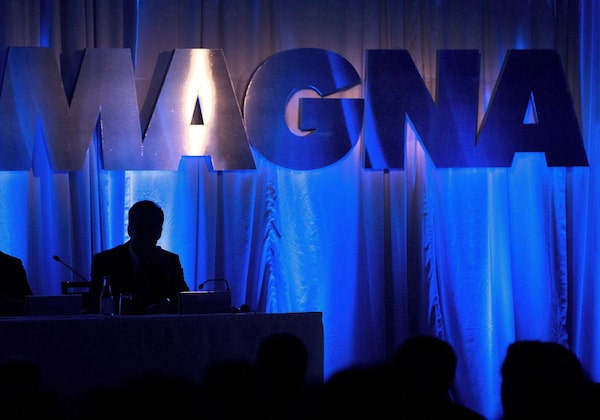
The Magna International Inc. sign is shown at the company's annual general meeting in Toronto on May 10, 2013.Nathan Denette/The Canadian Press
When Magna International Inc. laid out its compensation numbers last spring, it noted how the new executives it was hiring actually made less than their predecessors. Magna said it planned to continue the trend when the time came to pick a new CEO – “migrating” its pay levels “toward the median of the company’s executive compensation peer group."
If shareholders had a file folder labelled “better late than never,” they could place Magna’s proxy circular inside. The company, notorious for the hundreds of millions of dollars it shovelled at founder Frank Stronach, has made retiring chief executive officer Donald Walker a centimillionaire as well.
A study of Magna’s proxy circulars over the past 15 years of Mr. Walker’s tenure shows the company paid him US$230-million since 2005. The number includes more than US$100-million in cash bonuses, US$75-million in restricted-stock awards, and stock options Magna initially valued at US$35-million. (Magna, whose big customers are U.S. automakers, typically reports pay, and its financial results, in that country’s currency.)
Stock-sale records filed with Canadian securities regulators show Mr. Walker has exercised about half of the options he’s received as CEO to record profits of $109-million, in Canadian dollars. He still holds more than 2.7 million options that, at Friday’s closing price, would yield more than US$11-million in profits. (The value of these options is highly variable right now – at Magna’s 52-week New York Stock Exchange high of US$57.09, they were worth nearly US$23-million. He gets to keep them after he retires at year-end, the company confirms.)
Mr. Walker served as CEO for seven years beginning in 1994, left to run a Magna subsidiary, and then returned in April, 2005. He makes consistent appearances at the top of the charts when The Globe and Mail examines CEO pay. But each annual report is a snapshot in time; to sum up the numbers over the course of his recent CEO stint reveals a whole album of excess. The annual average over his career is more than US$15-million.
How is this possible? The key is a long-standing “entrepreneurial” compensation plan in which Magna set aside 10 per cent of pretax profit for employees, with 60 per cent of that pool dedicated to its executives. The 1984 version of Magna had pretax profit of US$57-million and an employee bonus pool of about US$6-million; by 2018, pretax profit was just shy of US$3-billion, making the pool approach $US300-million.
Magna used to pay Mr. Stronach a crazy 2.75 per cent of pretax profit, which would have given him bonuses of US$81-million and US$61-million in the past two years, I calculated based on Magna’s financial statements. In that context, Mr. Walker, a 33-year company veteran, gets a raw deal: Just 0.258 per cent of profit, a mere US$5.8-million in 2019.
(Magna did not respond to a request to address questions on compensation philosophy, but the circular says “this form of incentive is deeply rooted in our entrepreneurial culture, has been a critical factor in our past success, and we believe will be an important factor in our future success.”)
In the first few years of Mr. Walker’s tenure, the profit-sharing plan provided the bulk of his annual compensation. After the 2008-09 financial crisis (when, it must be noted, Magna made special retention payments to Mr. Walker when the unprofitable company failed to yield any bonus), stock and option awards began to play a larger role in pay.
That set up twin engines powering the pay: Mr. Walker made money when Magna posted profit, regardless of the stock’s performance; when the shares increased in value, he made even more.
This, then, leads us to that important question: How did Magna shareholders do? Well, over the 15-plus years of Mr. Walker’s tenure, Magna shares have returned nearly 400 per cent, which crushes the S&P/TSX Composite Index’s return of about 60 per cent. As with all stocks, there have been good and bad times. As of the end of 2019, actually, Magna had trailed both the composite and the S&P 500 over the previous five years, lagging the U.S. index rather significantly. Over that period, Mr. Walker collected US$100-million.
But back to the full tenure: As impressive as Magna’s 15-year return has been, an analysis performed with S&P Global Market Intelligence suggests it ranks 86th in total return out of 425 stocks that have traded on the Toronto Stock Exchange over that full period.
That’s solid top-quartile performance. But did any of the CEOs at the dozens of companies that outperformed Magna make a few hundred million for their efforts? I think I know the answer without adding up any more totals.
Your time is valuable. Have the Top Business Headlines newsletter conveniently delivered to your inbox in the morning or evening. Sign up today.